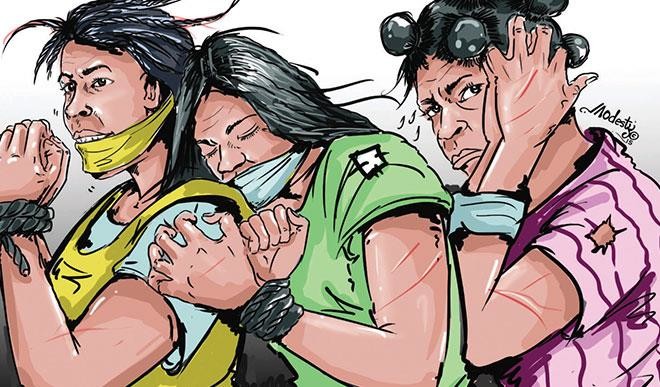Trafficking in persons still a booming business
The oldest was 13, the youngest eight. All of them, 24 girls, were rescued from two women in Wudil, Kano State, while being trafficked for domestic work. The women, Zulai Garba and Aisha Abdullahi Abubakar, got a year-long prison term each. They are two of the latest four successful prosecutions and convictions of suspects by […]


The oldest was 13, the youngest eight. All of them, 24 girls, were rescued from two women in Wudil, Kano State, while being trafficked for domestic work.
The women, Zulai Garba and Aisha Abdullahi Abubakar, got a year-long prison term each.
They are two of the latest four successful prosecutions and convictions of suspects by the National Agency for the Prohibition of Trafficking in Persons.
On record, some 285 suspects of trafficking in persons have been prosecuted to the point of conviction, signaling some progress against human trafficking in Nigeria.
But the trends are changing somewhat, officials of the agency have admitted.
Up to 80 million children in Africa labour in the modern form of human slavery, many of them girls, according to the agency.
At least 80,000 people rescued from the clutches of human traffickers are on psychosocial therapy.
In Maiduguri, civilian Joint Task Force is recruiting children as soldiers in its growing fight against insurgency. But trafficking is not a problem of Edo and northern states alone. New evidence from NAPTIP indicates its prevalence in at least 22 states in different forms, according to Josiah Emerole, head of press and public relations at the agency.
Quiet crime
Land, air and sea routes for internal and external trafficking from Nigeria have been documented. Nigeria is both a source, transit and destination country in trafficking but a rising worry is that trafficking from Nigeria has merged with Europe’s refugee crisis.
“There’s a significant number of Nigerians still part of the mixed migrant flux on the Mediterranean,” said Beatrice Jedy-Agba, Director-General of NAPTIP.
“Busloads still cross the desert,” she adds. “Because of the quiet nature of the crime, lots of victims are not willing to cooperate with us.”
Agents of NAPTIP have documented tricks traffickers use to lure their victims and keep the flow up.
Traffickers are never strangers to their victims, they throw wealth around to impress their victims and convince them a travel outside their local environment is best for them and their family.
They will offer help-even financing the entire trip-which they insist must be kept in confidence, and have sleek answers for nearly every question.
They also will swear to oaths of secrecy in shrines, pledging never to divulge information about the trip. Recently, traffickers have been noted to operate oath shrines from places such as Dubai.
Any passport related to the trip is usually fake; names like Happiness, Blessing and Patience are common. The victim is thereafter taken away and into slavery or as a bondage by the trafficker who might end up selling her to another trafficker.
One such girl from Edo State was encouraged to try for Europe overland by her boyfriend. Without her knowledge she was sold off several times, and N400,000 changed hands between Edo and Mali, where she was forced into prostitution for the equivalent of N150 per client, before she was rescued.
A difficult mandate
NAPTIP is still struggling to understand its mandate and explain to the public just what is human trafficking. An amendment to anti-trafficking inserted a catch-all for all acts that could constitute human trafficking-the act of recruiting by means of threat, force or coercion for the purpose of exploitation.
Successful prosecution of a human trafficking case must show act, means and purpose to succeed in court, where 80 other cases are currently dragging through.
Without the clarity, its roles looked to overlap with the mandates of sister agencies as the police. It also makes financial investigation difficult, according to Peter Essien, of the agency’s investigation and monitoring department.
NAPTIP conducts four types of investigation-reactive, proactive and disruptive-but it is the financial investigation that clinches the deal for a successful prosecution.
“It establishes evidential facts in hopes of confiscating proceeds.
“How much is generated, what proportion is still available and where is it kept, how to recover it,” Essien said.
Recovered proceeds are used to compensate people rescued from traffickers.
The amendment also prohibits employment of a child less than 12 for domestic work. However this is quite hard to implement as most families have domestic help within that age gap, there is also the provision of a three-year jail term if a child is defiled or not paid for services rendered or is bodily harmed.
The agency has called human trafficking a “blight on our collective humanity”-worsened by poverty and lack of awareness.
“There are 170 million Nigerians. If you dehumanise 100 million, do you think society would be worth living in?’ says Jedy-Agba.
